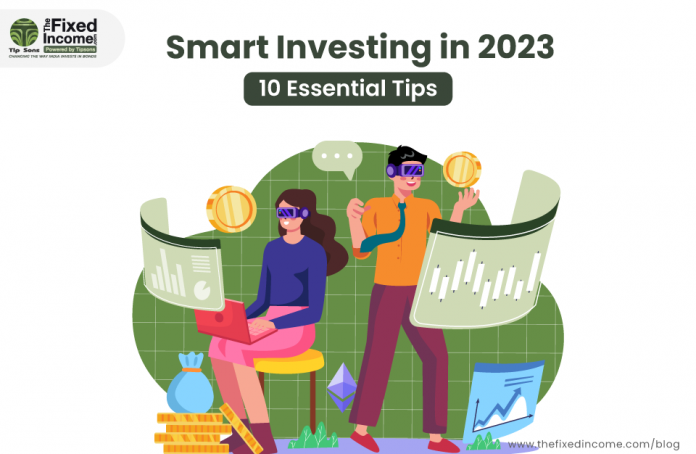In today’s world, investing has become more crucial than ever before. With a rapidly changing economic and political climate, finding the right investment options has become challenging, requiring a smart mindset and adequate knowledge.
For those considering investing in India, the stakes are even higher. With a booming economy expected to continue its growth trajectory, making informed investment decisions has become vital to unlocking the immense potential for financial growth and prosperity.
In this blog, we are excited to share ten essential tips that will help you navigate the Indian investment landscape in 2023 with confidence and achieve your financial goals.
1. Analyse the market trends
Analyzing market trends is paramount to embarking on the path of smart investing. With the investment landscape constantly evolving, staying up-to-date with the latest economic, political, and social developments is the cornerstone of making informed investment decisions.
The key to success lies in monitoring essential economic indicators such as,
- Stock market trends
- Global Economic Factors
- Inflation rates
- Interest rates
- GDP growth rates
By closely monitoring market trends, investors can position themselves for success and ensure that they are making robust investment decisions.
2. Diversify your investments
Smart investing thrives on the concept of diversification. One of the most effective ways to diversify your portfolio is by investing in both stocks and bonds. Here’s a comparison that demonstrates why diversification is critical:
- Stocks: Stocks are considered to be higher-risk investments that offer the potential for high returns. According to historical data, the compounded annual growth rate for Sensex is 12% over the last 10 years, as per a report in The Economic Times.
- Bonds: On the other hand, bonds are considered to be lower-risk investments that offer a more predictable return. The average return on investment-grade bonds is around 7-10%. However, bonds may have a lower return potential but are usually less volatile than stocks.
By combining both stocks and bonds in your portfolio, you can enjoy both benefits while minimizing the risks.
Here’s why diversification matters:
- It reduces risk by spreading investments across different assets, preventing the loss of all funds if one investment performs poorly.
- And it improves returns by lowering the chances of significant losses. Studies confirm that a diversified portfolio generates higher returns with less volatility than a non-diversified one.
To summarize, diversification is essential to smart investing. You can maximize rewards while lowering risks in your portfolio by combining stocks, bonds, gold, real estate, and other asset classes.
3. Start early
Indeed, time is the most precious asset when it comes to investing. As the old saying goes, “Time in the market, not timing the market, is what counts.” It is never too early (or late!) to start investing, and getting an early start can undoubtedly set you up for long-term financial success. Here are some compelling reasons why time is of the essence:
The Importance of Time in Investing
- More Time to Grow: Starting early provides investors ample time to grow their investments, potentially generating substantial long-term wealth.
- Consistent Investments: With a long investment horizon, investors can make small but consistent investments, allowing their savings to add up over time.
- The benefit of Compounding: Investing early also provides the benefit of compounding. Compounding refers to the concept of reinvesting earnings on investment to generate more revenues. Over time, compounding can multiply investments manifold.
- Risk Tolerance: An early start allows you to take on more risk while you are young and have plenty of time to make up for potential losses.
Remember, the benefits of investing early can result in more significant returns, options and opportunities. A long-term perspective and a plan are crucial for any successful investment strategy.
4. Learn the basics of accounting and finance
When it comes to investing, one must uphold the importance of having a basic understanding of accounting and finance. One can make smarter decisions that positively impact investment success by grasping simple yet significant ideas like return on investment, compounding, taxation, and portfolio diversification.
However, because the financial sector is constantly changing, investors need to keep themselves aware of the most recent adjustments and advancements. With this knowledge, investors can maximize their returns and navigate the complex investing world more easily and confidently. Furthermore, this will assist investors in selecting tax-efficient investments and evaluating the post-tax returns, thereby enhancing the overall portfolio returns.
5. Consider long-term investments
Long-term investments are a great way to grow wealth while mitigating risk. Thoughtfully choosing stocks, bonds, mutual funds or any other asset class can provide substantial returns over time- we’re talking about credible long-term growth here!
In fact, investors can share in future growth and revenues by investing in companies with a proven track record and a long-term vision. Long-term investments can provide a consistent income stream and offer the potential to build a substantial wealth corpus over time.
Speaking of time, it’s important to remember that long-term investments require patience and discipline. But with consistent attention and care, you have the potential for long-term success with your investments.
6. Keep emotions out of investing
Investing is a game of numbers, and emotions have no place in it. To make intelligent investment decisions, investors must keep their emotions in check. Panic selling in a market downturn or overconfidence in a bull run can lead to significant losses. A calm and analytical approach is necessary for a smart investor to succeed in the long run.
7. Choose the right investment advisor
Selecting the perfect investment advisor is critical for making smart investment decisions. A skilled investment advisor guides investors in making informed choices and keeps them up-to-date on the ever-changing financial landscape.
When seeking an advisor, it’s essential to consider their proven track record, extensive experience, and exceptional expertise and knowledge of the field. Additionally, it is important to select an advisor who is registered with the relevant regulatory bodies and possesses skills and qualifications. Equally important is finding someone who aligns with your investment goals and risk tolerance, ensuring they can provide tailored advice and guidance.
Remember, choosing the right investment advisor can indeed be a game-changer when it comes to achieving your financial goals. However, it is important to note that having an investment advisor is not obligatory. If an investor possesses adequate skills and research abilities to navigate through the market effectively, they may not require one. It is worth noting that investment advisors often charge fees or management charges, which will reduce the overall returns from an investment portfolio. Thus, it’s crucial to assess one’s own capabilities and evaluate whether the cost of an investment advisor aligns with the potential benefits they offer.
8. Avoid get-rich-quick schemes
Investing is a complex and challenging journey that requires careful planning and diligent execution. As tempting as it may be to seek out get-rich-quick schemes promising massive wealth in a short period, savvy investors understand that such schemes are often scams that can lead to significant financial losses.
Instead, what investors need is a long-term approach that prioritizes consistency and patience. While it may take time to see meaningful returns, a steady approach is the surest path to financial success. So, if you want to make smart investment decisions, remember to avoid the allure of quick riches and focus on building lasting wealth over time.
9. Invest in yourself
Investment can take many forms, but the most important one an individual can make is in themselves. Investors must keep up with the most recent trends and advancements in their business because the world is still evolving quickly.
By upskilling themselves, investors can unlock new opportunities, expand their horizons, and increase their income potential. In addition, investing in oneself demonstrates a long-term vision and an inquisitive mindset that are both critical for achieving real financial success.
So, if you’re looking to make wise investment choices, remember to prioritize investing in yourself first and use your knowledge and experience as a springboard to new opportunities and greater achievement.
10. Keep an eye on tax implications
Regarding smart investing, tax implications are a crucial consideration that can impact your returns significantly. Here are a few points to keep in mind:
- Keep up with the most recent tax regulations and deductions that concern your investments. This way, you can ensure you take full advantage of any opportunities to reduce your tax liability.
- Consider tax-efficient investment options, such as equity-linked saving schemes (ELSS), 54 EC Bonds, Tax-free Bonds, or National Pension Scheme (NPS) etc. These investments can help you maximize your after-tax returns, allowing you to keep more of your hard-earned money in your pocket.
- Remember that taxes are an essential part of the investment process. But by staying informed and making smart decisions, you can minimize your tax burden and achieve your financial goals.
Keeping these points in mind will help you make informed choices and maximize your investment returns. So stay alert, keep learning, and make the most of every opportunity to build lasting wealth.
Conclusion
In conclusion, investing wisely requires a combination of careful analysis, strategic planning, and a commitment to continuous learning. By implementing the above-outlined 10 essential tips, you can position yourself for success in the Indian Investment landscape. Remember, investing is a journey that requires continuous learning, adaptability, and a long-term perspective. With the right knowledge and long-term perspective, you can achieve your financial goals and secure a prosperous future. Happy Investing!
























